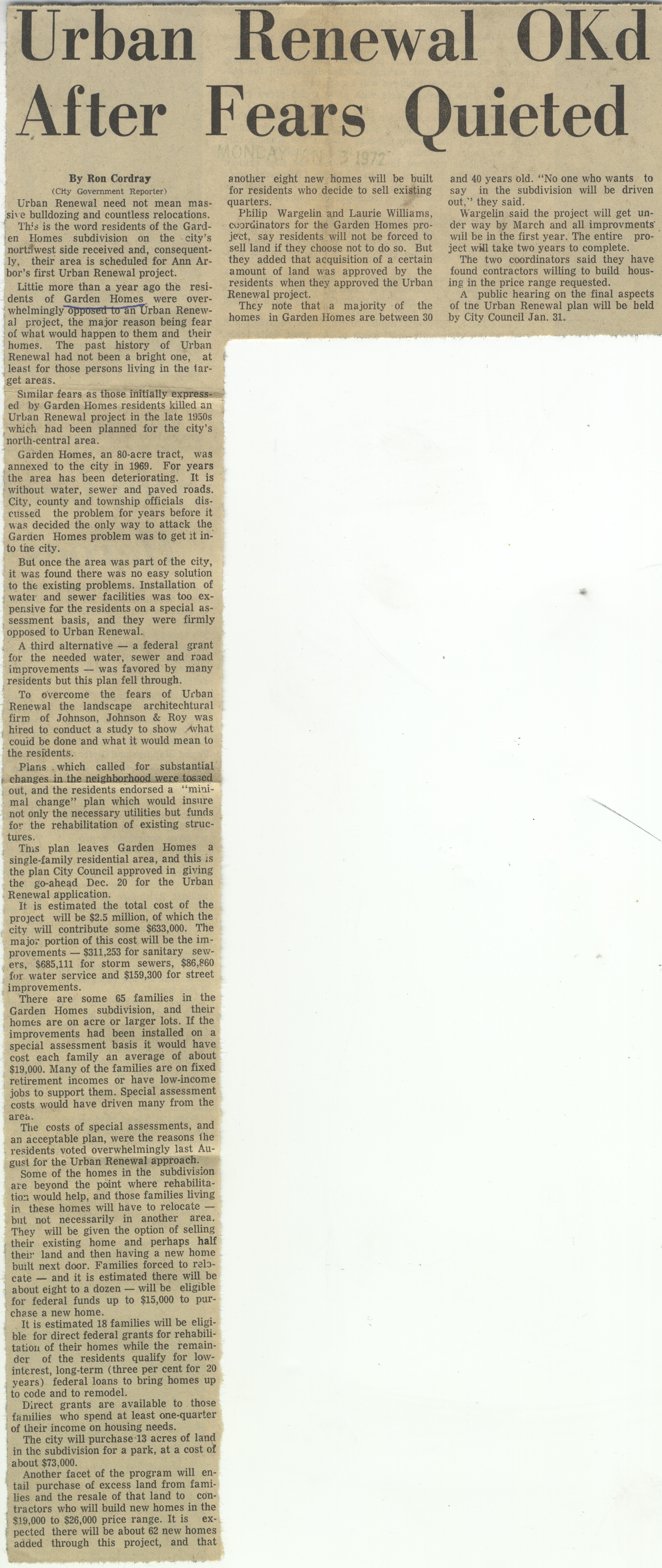Urban Renewal OKd After Fears Quieted

Urban Renewal OKd After Fears Quieted
By Ron Cordray
(City Government Reporter)
Urban Renewal need not mean massive bulldozing and countless relocations.
This is the word residents of the Garden Homes subdivision on the city’s northwest side received and, consequently, their area is scheduled for Ann Arbor’s first Urban Renewal project.
Little more than a year ago the residents of Garden Homes were overwhelmingly opposed to an Urban Renewal project, the major reason being fear of what would happen to them and their homes. The past history of Urban Renewal had not been a bright one, at least for those persons living in the target areas.
Similar fears as those initially expressed by Garden Homes residents killed an Urban Renewal project in the late 1950s which had been planned for the city’s north-central area.
Garden Homes, an 80-acre tract, was annexed to the city in 1969. For years the area has been deteriorating. It is without water, sewer and paved roads. City, county and township officials discussed the problem for years before it was decided the only way to attack the Garden Homes problem was to get it into the city.
But once the area was part of the city, it was found there was no easy solution to the existing problems. Installation of water and sewer facilities was too expensive for the residents on a special assessment basis, and they were firmly opposed to Urban Renewal.
A third alternative — a federal grant for the needed water, sewer and road improvements — was favored by many residents but this plan fell through.
To overcome the fears of Urban Renewal the landscape architectural firm of Johnson, Johnson & Roy was hired to conduct a study to show what could be done and what it would mean to the residents.
Plans which called for substantial changes in the neighborhood were tossed out, and the residents endorsed a “minimal change” plan which would insure not only the necessary utilities but funds for the rehabilitation of existing structures.
This plan leaves Garden Homes a single-family residential area, and this is the plan City Council approved in giving the go-ahead Dec. 20 for the Urban Renewal application.
It is estimated the total cost of the project will be $2.5 million, of which the city will contribute some $633,000. The major portion of this cost will be the improvements — $311,253 for sanitary sewers, $685,111 for storm sewers, $86,860 for water service and $159,300 for street improvements.
There are some 65 families in the Garden Homes subdivision, and their homes are on acre or larger lots. If the improvements had been installed on a special assessment basis it would have cost each family an average of about $19,000. Many of the families are on fixed retirement incomes or have low-income jobs to support them. Special assessment costs would have driven many from the area.
The costs of special assessments, and an acceptable plan, were the reasons (he residents voted overwhelmingly last August for the Urban Renewal approach.
Some of the homes in the subdivision are beyond the point where rehabilitation would help, and those families living in these homes will have to relocate — but not necessarily in another area. They will be given the option of selling their existing home and perhaps half their land and then having a new home built next door. Families forced to relocate — and it is estimated there will be about eight to a dozen — will be eligible for federal funds up to $15,000 to purchase a new home.
It is estimated 18 families will be eligible for direct federal grants for rehabilitation of their homes while the remainder of the residents qualify for low-interest, long-term (three per cent for 20 years) federal loans to bring homes up to code and to remodel.
Direct grants are available to those families who spend at least one-quarter of their income on housing needs.
The city will purchase 13 acres of land in the subdivision for a park, at a cost of about $73,000.
Another facet of the program will entail purchase of excess land from families and the resale of that land to contractors who will build new homes in the $19,000 to $26,000 price range. It is expected there will be about 62 new homes added through this project, and that another eight new homes will be built for residents who decide to sell existing quarters.
Philip Wargelin and Laurie Williams, coordinators for the Garden Homes project, say residents will not be forced to sell land if they choose not to do so. But they added that acquisition of a certain amount of land was approved by the residents when they approved the Urban Renewal project.
They note that a majority of the homes in Garden Homes are between 30 and 40 years old. "No one who wants to stay in the subdivision will be driven out,” they said.
Wargelin said the project will get under way by March and all improvements will be in the first year. The entire project will take two years to complete.
The two coordinators said they have found contractors willing to build housing in the price range requested.
A public hearing on the final aspects of the Urban Renewal plan will be held by City Council Jan. 31.